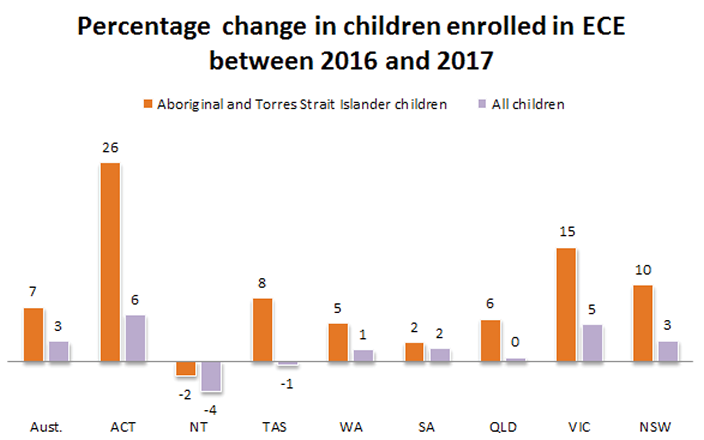The Northern Territory (NT) is the only Australian state or territory not to meet the early childhood education benchmark in the 2018 Closing the Gap report. Despite the overall early childhood education target being on track, the fact that the jurisdiction with the highest population of Aboriginal and Torres Strait Islander peoples is falling behind is of serious concern.
Journalist Sara El Sayed explores the issue.
A commitment to early childhood education is a must in order to support the development of children.
This need is twofold for Aboriginal and Torres Strait Islander children, who are twice as likely to be developmentally vulnerable than non Indigenous children.
With the Northern Territory presenting as an outlier in the Closing the Gap report’s progression of early childhood education targets, understanding the distinct issues facing the Indigenous community in the NT is crucial.
Enrolment rates and attendance
The Closing the Gap report shows a clear difference between the number of children enrolled in early childhood education and the number of children actually attending.
The Northern Territory was the only jurisdiction to experience a negative change in enrolment of Aboriginal and Torres Strait Islander children.
Recorded rates of Indigenous children attending 15 or more hours of kindergarten per week in the Northern Territory are the lowest in the country (29%), despite showing the greatest improvement (41%) in the one week reference period of data collection. The report acknowledges there is minimal available data on attendance rates in early childhood education.
Identified issues
The Early Childhood Australia NT Inclusion Support Agency has highlighted a number of issues that have arisen throughout its work in early childhood education and care, including:
• Aboriginal and Torres Strait Island children not always being given opportunities for education and care due to remoteness
• families having competing priorities and associated complexities
• professional development for educators not always being available or consistent
• the transient nature of work in the Territory and subsequent unavailability of a work-ready and skilled workforce
• service delivery difficulties, and
• inflexibility and complexity of funding agreements.
The Agency noted that in order to address these issues, more work needs to be done in terms of:
• developing culturally competent service delivery
• improving workforce capability, and
• cultivating networks, relationships and collaborations with the Aboriginal and Torres Strait Islander community.
IEUA-QNT Research Officer Adele Schmidt said the only way this can be effectively achieved is if education authorities listen to the needs of the community by allowing Aboriginal and Torres Strait Islander peoples a voice at the decision making table.
“Research consistently shows, in Australia as well as on a global scale, that what makes a difference is working with Indigenous communities to understand and meet their educational needs and aspirations.
“Collaboration is key,” Schmidt said.



































































































































